Crime for the sake of a client: what violations do lawyers commit?
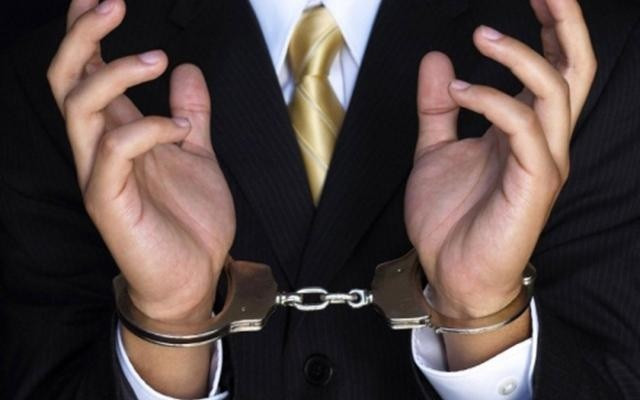
Although the lawyer is obliged to prioritize the interests of the client in his or her professional activities, this priority is limited by the principle of legality. Those attorneys who try to circumvent the law for the sake of their clients may become involved in a criminal case themselves.
Oleksiy Gorokh, Deputy Chairman of the Ukrainian National Bar Association's Committee on Criminal Law and Procedure, spoke about typical criminal offenses that attorneys may commit in the interests of clients during a recent training event held at the Higher School of Advocacy.
He named such special criminal offenses:
- disclosure of commercial or banking secrets (Article 232 of the CC);
- illegal use of insider information (Article 232-1 of the CC);
- forgery of documents, seals, stamps and forms, their sale or use (Article 358 of the CC);
- interference in the activities of the judiciary (Article 376 of the CC);
- interference with the work of the automated court document management system (part 2 of Article 376-1 of the CC).
- disclosure of information about security measures in relation to a person taken under protection (Article 381 of the CC);
- failure to execute a court decision (Article 382 of the CC);
- knowingly false report of a criminal offense (Article 383 of the CC);
- misleading a court or other authorized body (Article 384 of the CC);
- obstructing the appearance of a witness, victim, or expert, forcing them to refuse to testify or give an opinion (Article 386 of the CC);
- disclosure of data from operational and investigative activities, pre-trial investigation (Article 387 of the CC);
- unlawful actions in relation to seized property, pledged property or property that is described or subject to confiscation (Article 388 of the CC);
- concealment of a crime (Article 396 of the CC).
O. Gorokh separately highlighted special criminal offenses aimed at transferring unlawful benefits to officials. As an example, he cited the verdict of the High Anti-Corruption Court of 24.04.2024 in case No. 991/2024/24, under Art. 369 (Incitement to provide undue advantage) of the Criminal Code, where the lawyer assured the client of the existence of a preliminary agreement with the judge of the district court to positively resolve the issue of closing two cases of administrative offenses against him. The client, acting under the control of law enforcement agencies, provided the lawyer with imitation funds.
The UNBA representative also mentioned the crime of abuse of influence (Article 369-2 of the Criminal Code). According to the position of the Criminal Court of Cassation of the Supreme Court (resolution of the OP in case No. 554/5090/16-k), the disposition of the article does not specify the nature of influence on a person, so the concept of influence includes the use of friendly, family, personal relationships with a person authorized to perform state functions.
However, representation in court without authority (Article 400-1 of the Criminal Code), which consists in knowingly falsely informing the court of the authority to represent another person in court, or in the deliberate failure of the lawyer to include in the warrant information on the limitations of authority established by the legal aid agreement, is a special provision of Article 358 (Forgery of Documents) of the Criminal Code. Therefore, the attorney-at-law believes that in order to overcome the competition between general and special legal norms, a socially dangerous act should be qualified by a special norm. O. Gorokh also reminded about discipline. As an example, he cited the decision of the Higher Qualification and Disciplinary Commission of the Bar, which suspended the lawyer's right to practice law for filing a statement with the court as a representative of the complainant without concluding a legal aid agreement, based on an order where the lawyer provided false information about the existence of the agreement and its details.
Popular news
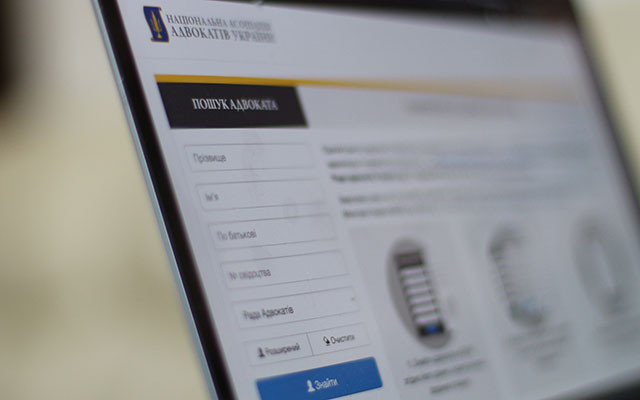
URAU
Access to advocate contacts in URAU has been restored
The Bar Council of Ukraine has opened up public access to data from the Unified Register of Advocates of Ukraine, which was closed at the start of the full-scale invasion in 2022. The decision was made at a meeting on December 12–13.
Self-government
Members of the QDCB are not required to submit declarations - BCU
Bar Council of Ukraine examined the legal status of members of bar self-government bodies and found that they are not required to submit declarations of persons authorized to perform functions of state or local self-government.
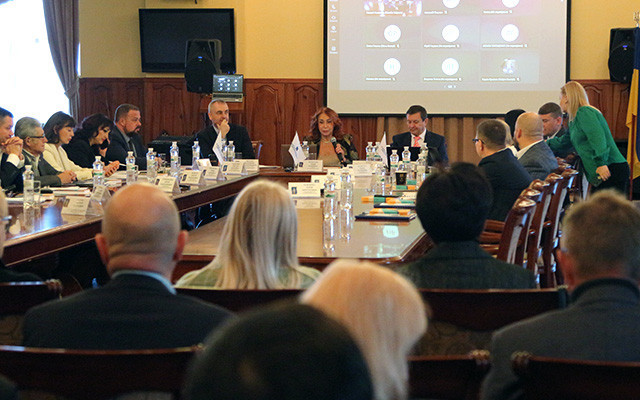
Self-government
BCU has identified 12 areas for implementing the Roadmap for advocacy
During its meeting on December 12, the Bar Council of Ukraine considered the Roadmap on the Rule of Law, approved by Order of the Cabinet of Ministers of Ukraine No. 475-r dated May 14, 2025. The document provides for the development and adoption of a draft law on improving the legal regulation of advocacy by the fourth quarter of 2026.
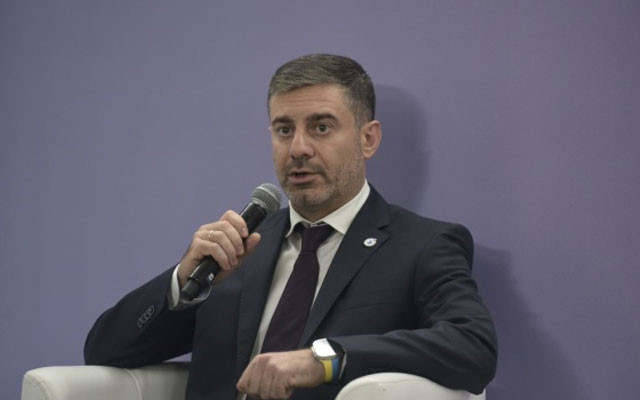
Guarantees of the practice of law
The Ombudsman acknowledged the problem of violation of the human right to legal aid in the TCC
The Verkhovna Rada Commissioner for human rights Dmytro Lubinets confirmed the existence of a problem with ensuring the constitutional right to professional legal assistance in territorial recruitment and social support centers.

Guarantees of the practice of law
The agreement on the provision of legal assistance is not public – BCU
Bar Council of Ukraine in its decision No. 111 dated October 18, 2025, responded to questions regarding the possibility of concluding legal assistance agreements by accepting a public offer, using an electronic form of the agreement, and posting information about legal assistance on websites.
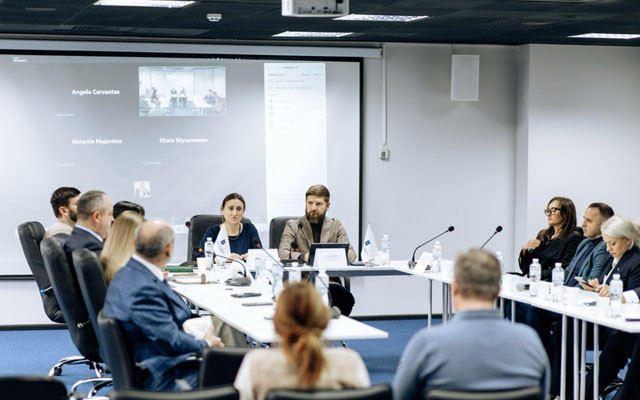
Discussion
Why preventive measures have turned into preventive punishment in Ukraine: round table discussion
The European approach, enshrined in the CPC, provides for detention as an exceptional preventive measure: courts must prove the impossibility of milder alternatives and carefully assess the risks. In practice, however, it is increasingly being applied almost automatically, eroding standards of freedom.
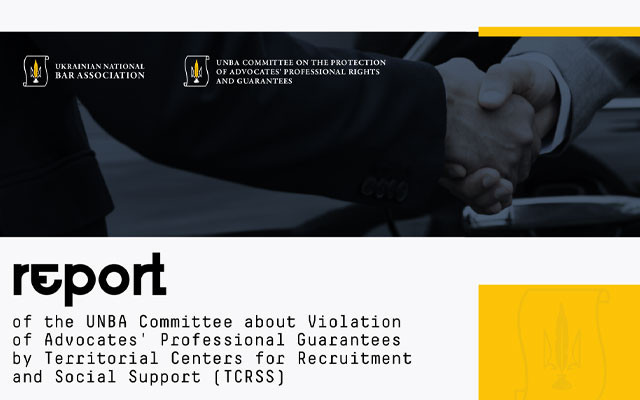
Guarantees of the practice of law
The UNBA presented a report on violations of advocates' rights in the TCC
The Committee for the protection of advocate's rights and guarantees of legal practice of the UNBA has prepared a consolidated report on violations of advocate's professional rights and guarantees of legal practice by territorial recruitment and social support centers for the period from 2022 to the first half of 2025.
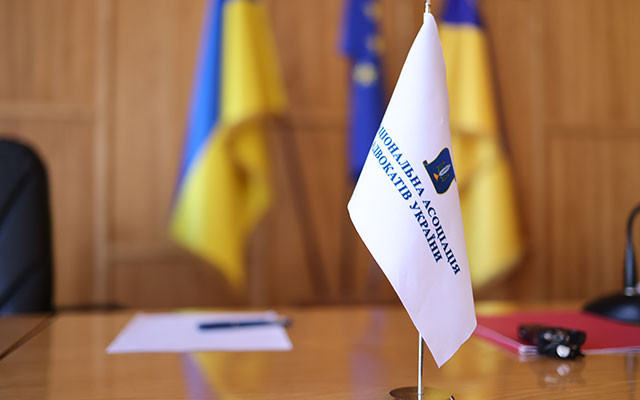
Self-government
Statement by the UNBA Committee regarding manipulative journalistic material
Statement by the UNBA Committee on information policy and interaction with the media regarding manipulative journalistic material aimed at discrediting the advocacy institution.
Publications

Censor.net Protecting advocates – protecting justice: addressing concerns about the new law

Ihor Kolesnykov A BRIEF SUMMARY REGARDING THE APPLICATION OF THE ORDER ON EXTENDED CONFISCATION IN LATVIA REGARDING FINANCIAL ASSETS OF…

Valentyn Gvozdiy WORKING IN A WAR ZONE

Lydia Izovitova Formula of perfection

Sergiy Vylkov Our judicial system is so built that courts do not trust advocates

Iryna Vasylyk Advocacy in the proclamation of Independence of Ukraine

Oleksandr DULSKY When we cross the border of the Supreme Anti-Corruption Court, we get into another department of the National Anti-Corruption…

Vadym Krasnyk The UNBA will work, and all obstacles and restrictions are only temporary inconveniences
